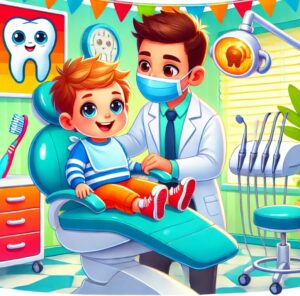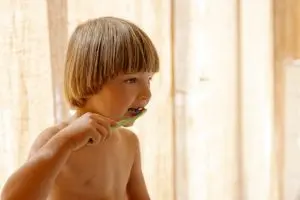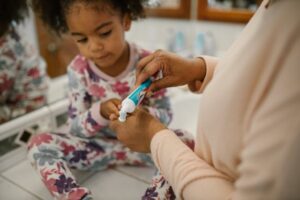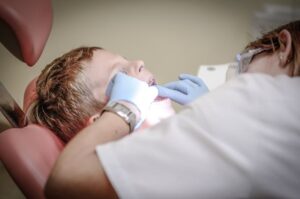Baby teeth are a crucial part of every child’s growth and development. While they are temporary and will eventually be replaced by permanent teeth, they serve many essential functions in a child’s oral health and overall well-being. This article explores the significance of baby teeth, their role in oral health, and how parents can take care of them to ensure their children’s long-term dental health.
1. Baby Teeth as Guides for Permanent Teeth
Baby teeth usually begin to emerge around six months of age and are gradually replaced by permanent teeth around age 12. Although temporary, baby teeth are essential for guiding the growth and alignment of permanent teeth. If a baby tooth falls out too early or is extracted before its time, it can cause misalignment or spacing issues with the permanent teeth, which may require orthodontic treatment later.
According to the American Dental Association (ADA), properly aligned baby teeth provide a framework for permanent teeth to erupt in the correct positions【Source: American Dental Association】.
2. Baby Teeth Help With Chewing and Speech Development
Baby teeth are necessary for children to learn how to chew food properly, which supports healthy nutrition. They also play a key role in the development of speech. Without healthy baby teeth, children may struggle to chew food effectively, which could lead to nutritional deficiencies. Additionally, baby teeth help children form correct speech sounds, especially in the early stages of language development.
For example, speech sounds like "t" and "d" require the presence of baby teeth. Missing teeth during this phase can result in speech delays or difficulty pronouncing certain words correctly.
3. Baby Teeth Prevent Oral Diseases
Healthy baby teeth are the first line of defense against oral diseases in children. If not cared for properly, baby teeth are prone to cavities, which can cause pain, discomfort, and damage to the tooth. According to the National Institutes of Health (NIH), untreated cavities in baby teeth can also have an impact on a child's overall well-being, affecting their ability to eat and sleep【Source: National Institutes of Health】.
In addition, the presence of healthy baby teeth helps prevent further oral complications, such as infections or gum disease, which could affect both the baby teeth and emerging permanent teeth.
4. Baby Teeth and Mental Health
A child’s appearance is linked to their self-esteem, and dental issues can have a significant impact on their confidence. Painful or damaged baby teeth can cause a child to feel self-conscious, especially when they begin interacting with others. Healthy baby teeth help children feel more confident in their smiles, which is crucial for their emotional and social development.
When baby teeth are in good health, children are less likely to suffer from the emotional distress that can arise from dental pain or embarrassment about their teeth.
5. How to Care for Baby Teeth
Maintaining the health of baby teeth is essential for long-term oral health. Here are some important tips for parents:
- Start Brushing Early: Begin brushing your child’s teeth as soon as they appear. Use a soft-bristled toothbrush and fluoride-free toothpaste designed for children. Regular brushing helps remove plaque and food particles, preventing tooth decay.
- Regular Dental Visits: Schedule a dental checkup every six months to ensure your child’s teeth are healthy and free of cavities. Dentists can detect early signs of dental issues and provide preventative care.
- Encourage Healthy Eating Habits: Limit sugary snacks and drinks, as sugar contributes to cavities and tooth decay. Offer nutritious foods like fruits, vegetables, and whole grains to support overall health.
- Avoid Hard Objects: Ensure that children don’t chew on hard objects, such as ice or hard toys, which can damage baby teeth.
6. Post-Teething Care
Baby teeth start to fall out around age 6 and continue to be replaced by permanent teeth until around age 12. After a baby tooth falls out, it’s important to maintain proper oral hygiene. Parents should observe the new permanent teeth as they emerge, and consult a dentist if there are any concerns about alignment or other dental issues. If a baby tooth falls out prematurely, a dentist may recommend a space maintainer to prevent misalignment of the permanent teeth.
Conclusion
Baby teeth may be temporary, but they are vital to a child’s overall health and development. They play an essential role in guiding the growth of permanent teeth, enabling proper chewing and speech, and preventing oral diseases. Proper care and maintenance of baby teeth are crucial for ensuring that children grow up with healthy, strong permanent teeth. By following good oral hygiene practices, scheduling regular dental checkups, and encouraging a balanced diet, parents can help their children develop healthy teeth that last a lifetime.
References:
- American Dental Association (ADA): Recommendations for children’s oral health
- National Institutes of Health (NIH): The impact of oral health on children’s overall health
- American Academy of Pediatric Dentistry (AAPD): Importance of baby teeth in early childhood development













